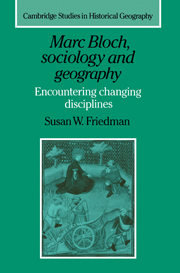Book contents
- Frontmatter
- Contents
- List of tables
- Acknowledgments
- A note on translation
- List of abbreviations
- Introduction
- 1 Marc Bloch and the “Université”
- PART I Sociology, geography, and history during Marc Bloch's years of apprenticeship
- PART II Marc Bloch as a critic and practitioner of sociology and geography
- 6 The University of Strasbourg as a center of disciplinary change
- 7 Kings, serfs and the sociological method
- 8 Reflections on the geographical approach and on the agrarian regime
- 9 An expanding view: Marc Bloch's later projects
- 10 Towards a reworking of the historiography of Marc Bloch
- Notes
- Index of names
- Subject index
- Cambridge Studies in Historical Geography
8 - Reflections on the geographical approach and on the agrarian regime
Published online by Cambridge University Press: 23 November 2009
- Frontmatter
- Contents
- List of tables
- Acknowledgments
- A note on translation
- List of abbreviations
- Introduction
- 1 Marc Bloch and the “Université”
- PART I Sociology, geography, and history during Marc Bloch's years of apprenticeship
- PART II Marc Bloch as a critic and practitioner of sociology and geography
- 6 The University of Strasbourg as a center of disciplinary change
- 7 Kings, serfs and the sociological method
- 8 Reflections on the geographical approach and on the agrarian regime
- 9 An expanding view: Marc Bloch's later projects
- 10 Towards a reworking of the historiography of Marc Bloch
- Notes
- Index of names
- Subject index
- Cambridge Studies in Historical Geography
Summary
In his post-war writings on human geography, Bloch's position was first and foremost that of a critic rather than a practitioner – a contrast to his on-going attempts to write on sociological topics. Despite his many significant criticisms, he would argue in numerous reviews of geographical works that a geographical perspective had a valuable contribution to make to the type of interdisciplinary work that he found most satisfying. Eventually, through his efforts to write a synthesis of the agrarian history of France, Bloch became more directly involved in the use of geographical materials and methods and was himself a major subject of discussion and criticism by the inter-war geographers.
Despite Vidal's death in 1917, the inter-war French geography with which Bloch was engaged continued to follow the lead established by Vidal at the turn of the century. In part, this continuity was due to the power wielded by the first generation of Vidalians on academic juries. Characteristics in common included the preference for regional monographs, the important place given to physical features – especially those of geomorphology (a tendency strengthened by de Martonne's new leadership role), the stress on rural as opposed to urban or economic geography, a focus on France, and a reluctance to enter into serious methodological discussion.
- Type
- Chapter
- Information
- Marc Bloch, Sociology and GeographyEncountering Changing Disciplines, pp. 134 - 151Publisher: Cambridge University PressPrint publication year: 1996



